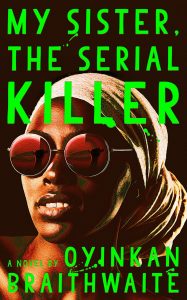
 Bloodstains menace the pages of My Sister, the Serial Killer.
Bloodstains menace the pages of My Sister, the Serial Killer.
In the novel’s first chapter, Ayoola — gorgeous, magnetic and the eponymous murderer — has just fatally stabbed her boyfriend of exactly one month, on their anniversary. Imperiled by a bathroom splattered with evidence, she calls her sister Korede for help disinfecting the crime scene and disposing her lover’s corpse. Korede, who also serves as the story’s narrator, is appropriately wary but resolutely thorough, fulfilling her duties as an older sister by answering Ayoola’s summon with bleach in hand. By this point, Korede’s clean-up regimen is scientific.
She’s done it twice before.
Oyinkan Braithwaite’s trim tale of family, trauma and sibling rivalry is the Chautauqua Literary and Scientific Circle’s selection for Week Six, “What’s Funny?” Braithwaite, a short story author, artist and Kingston University graduate, will give her CLSC Author Presentation on the book at 3:30 p.m Thursday, August 1 in the Hall of Philosophy.
Winner of the 2019 Los Angeles Times Award for Best Crime Thriller, My Sister, the Serial Killer was recently announced as one of 13 books chosen for the 2019 Booker Prize for Fiction longlist. It is the only debut novel on this year’s list, one that boasts the work of past CLSC authors Margaret Atwood and Salman Rushdie.
Atom Atkinson, director of literary arts, described Braithwaite’s novel as “incredibly taut, funny (and) well-crafted” — the perfect, if unobvious, pick for a comedy-centric week. Braithwaite herself remembers “being a little surprised” when she first saw My Sister, the Serial Killer categorized as a “dark comedy.”
“At the time, I knew I was writing a fairly dark tale, only I didn’t want to be submerged in darkness for the time that it would take me to complete it,” she said. “So I chose to be matter-of-fact about the things that were happening; my characters would clean blood and then go about their daily business. This contrast shocks the reader a little, and I believe humor, or at least the typical joke, is all about subverting expectation.”
For Atkinson, such genre tension invites the reader to think actively about the experience of reading a book.
“Is there joy?” they asked. “Is there discomfort? Is there a mixture of joy and discomfort? (My Sister, the Serial Killer) feels like, in one moment, a Jane Austen portrait of two sisters; in another moment, like pulpy, hardboiled crime fiction; and, in another, both of those at the same time.”
In early conceptual stages of the novel, it was not two Sense and Sensibility-esque sisters, but two friends that would be bound by spilled blood. Braithwaite decided she “wanted something beyond choice” to tether her characters together, and so settled on sisters Ayoola and Korede — one christened with a “soft-sounding name” and the other with “a harder, more broken-up-sounding name” to reflect the contours of their respective personalities.
“You choose who your friends are,” Braithwaite said. “You don’t choose your family. And the relationship between sisters can be quite contentious, but the love and loyalty, for the most part, is there. I think it is an interesting dynamic.”
Although the beautiful Ayoola is lethal to the men who desire her and frustrating to a readership fed up with her frivolity, Braithwaite called her “an absolute joy to write.”
“I didn’t have to think too hard and long about what she would say or how she would say it,” she said. “I could be free and somewhat absurd when it came to her and the choices she made,” like posting Snapchats of an injury sustained during an attempted homicide, for example.
Braithwaite, who described herself as “truly grateful” for the book’s honors, “loves” when readers admit that “they laughed at the most inappropriate moments,” and when people credit My Sister, the Serial Killer for “(getting) them reading again.” For her part, she enjoyed Gail Honeyman’s 2017 debut novel Eleanor Oliphant is Completely Fine about a brilliant social outcast who falls illogically in love with a local musician, but doesn’t label herself a consistent consumer of “funny” books.
“I am usually quite inspired after reading or watching a good epic fantasy, one that has your blood pumping,” she said. “So perhaps, one day, I’ll give that a try.”
As an acclaimed spoken word poet — she was shortlisted as a top 10 spoken word artist in the 2014 Eko Poetry Slam — Braithwaite said she is “quite conscious of the way sentences and words sound,” and she cites poetry as the probable cause for her penchant for brevity in prose. The first chapter of My Sister, the Serial Killer is only 20 words long, and none of the chapters that follow exceed six pages.
“(The shortness of the chapters) contributes to the pace at which you feel like something dreadful is coming, and also your inability to put (the book) down,” Atkinson said. “You could just read one more.”
Braithwaite noted that she has “learned you can do a lot with a little.”
“But I am still learning, still evolving,” she said. “I like to try new things.”




